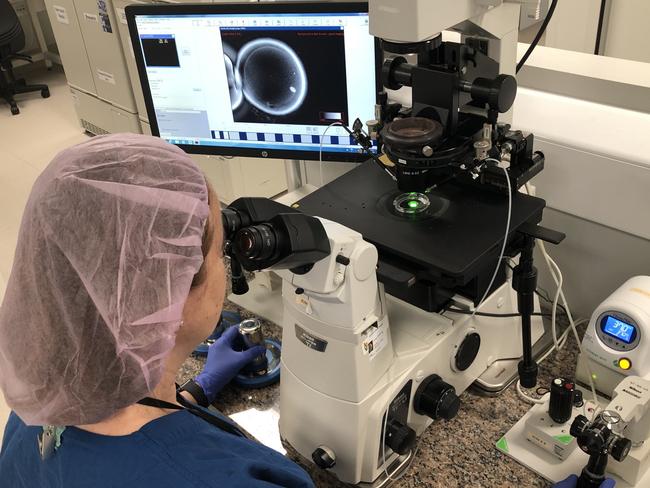Australian women defy age code to get taxpayer-funded IVF at age 65 and older
Women old enough to be grandmothers are getting fertility treatment just like younger women seeking to be mums. But experts are divided, with one saying: “the first old lady who dies in childbirth will be a front page story and we will be hung”.
Parenting
Don't miss out on the headlines from Parenting. Followed categories will be added to My News.
Women old enough to be grandmothers and many past the age of menopause are getting taxpayer funded fertility treatment in defiance of the Fertility Society of Australia’s voluntary code.
A News Corp investigation has uncovered that Medicare data shows since 2014, taxpayers have funded four fertility treatments for four women aged over 65 and one woman in this age group had an embryo transferred using IVF.
Medicare data also showed that a woman aged 75 appeared to have undergone an egg stimulation and retrieval procedure but when contacted, the Department of Human Services said this was an error.
At our request the department is currently investigating the cases of the 65-year-old women.
Guidelines for fertility treatment in Australia discourage IVF treatment in women who are past the age of menopause — 50-51 years of age.
Doctors who perform treatment in women over this age limit are supposed to discuss the cases with an ethics committee because of concerns for the mother’s health and the fact that older parents may not live long enough to support the child.
IVF Australia’s Professor Michael Chapman said scientifically it was now possible to reverse menopause and “technically there is no age at which a woman can’t have a baby”.
“It’s more about the ethics of children having very old parents or not having parents at all (if they died),” he said.

News Corp found in the past five years, 14 embryos were transferred into women aged over 55 and nearly 9000 embryo transfers were performed on women aged 45-54.
This is despite IVF success rates dropping to around six per cent for women aged 43 and to one per cent once they reach the age of 45.
Last year the Fertility Society of Australia condemned the overseas practice of providing assisted reproductive technology to women over the age of menopause.
It came after Indian mother Erramatti Mangayamma, 74, gave birth to twins in September last year after using IVF making her the oldest person ever to give birth.
The day after the birth her husband Raja Rao aged 78 was hospitalised after having a heart attack.
Professor Luk Rombauts the president of the Fertility Society of Australia there was no age limit on IVF treatment in Australia.
“It’s not illegal, there is no age limit ... but it would be futile and medically contraindicated, (on a 75-year-old),” he said.
Doctors at Monash IVF would not harvest eggs on women once they reached 46 years of age while some centres may try to harvest eggs at age 47 or 48, he said.
The 65-year-old Australian woman who received an embryo transfer may have been a surrogacy case, a mother carrying a child for her daughter or another data entry error, he said.
In 2016, a 62-year-old Tasmanian woman who gave birth at Melbourne’s Frances Perry Private Hospital became Australia’s oldest mother, it is thought she was impregnated overseas using IVF.
MORE NEWS
Cost of IVF slashed for thousands of women in NSW
The hidden costs in your health fund
The disease set to become Australia’s biggest killer
AFL legend opens up on losing family to dementia
Plan to double the price of cask wine
Professor Rombaut said IVF clinics in Australia regularly transfer embryos into women aged over 50 using frozen embryos created before the woman turned 50 or using donor eggs but they would not harvest eggs in a woman this age.
Women aged 50 and 55 “we can get you pregnant as easily as a 25-year-old using donor or frozen eggs,” he said.
IVF treatment on older women was becoming more common as there was an increasing shift to women freezing and storing their eggs earlier in life while they continued their search for a partner.
“They key issue in reproduction is the age of the eggs, not the age of the mother,” he said.
IVF Australia’s Professor Michael Chapman said he had used IVF on a 54-year-old woman who was acting as a surrogate mother for her 30-year-old daughter who had cancer and could not get pregnant naturally.
“The mother passed the medical fitness test,” he said.
“We take women up to age 55 in our clinic but they have to go through rigorous cardiac and diabetes testing,” he said.
Fifteen years ago IVF doctors were reluctant to give treatment to women aged over 45 but practice had evolved and increasingly they were treating women up to the age of 55.
An increase in the number of women freezing their eggs while young who were seeking IVF treatment using those eggs in their fifties was driving a change in practice, he said.
“There is an ongoing debate in the profession and society every time a patient over 60 has treatment,” he said.
“The science is in and it is possible but I think society is definitely not there yet,” he said.
“The first old lady who dies in childbirth will be a front page story and we will be hung, drawn and quartered when that happens,” he said.
Originally published as Australian women defy age code to get taxpayer-funded IVF at age 65 and older


